by Fikret Akfırat
US State Department officials are working on more Libyan issues these days. Washington’s influence over the Abdul Hamid Dbeibah-led, UN-recognized Government of National Unity (GNU) in the country’s west has grown since the middle of last year, and Türkiye’s gains in Libya are coming under increasing threat. An important development that occurred earlier this year was the annulment by a Libyan court of an agreement that Türkiye had signed in October 2022 granting it the right to conduct hydrocarbon exploration activities in Libya. The Dbeibah administration, which signed the agreement on behalf of Libya, remained silent on this issue.
In another important development, the United States has begun work to reactivate its diplomatic facility in Libya, which it vacated in 2014. The US administration has asked Congress to rebuild the diplomatic mission in Tripoli. The 2025 budget proposal requests $57.2 million for this mission. According to Al Monitor, a UK-based website known for its good reporting from US sources, the top priority for the US is to prevent Russia from increasing its weight in the balance of power in the region. The article goes on:
“The Biden administration has notified Congress of its plan to restore the US diplomatic presence in Libya, a decade after unrest in the North African country forced American diplomats to evacuate the US Embassy in Tripoli. The State Department submitted a formal notification to lawmakers this month, a senior State Department official told Al-Monitor, kicking off what the department expects will be a one-to-two-year process to establish “an interim diplomatic facility” in the Libyan capital of Tripoli. The United States has been without an embassy in Libya since its personnel withdrew under heavy military escort in 2014 amid the budding civil war. American diplomats relocated to Malta and later Tunisia, where they now form a remote mission known as the Libya External Office.[1]
The agenda items for the G7 foreign ministers’ meeting in Capri on April 18 included sanctions against Iran for its retaliatory attack against Israel, support for Ukraine, and Libya. In the declaration issued after the summit, Africa got a lot of attention. In addition to Libya, the G7 declared that their focus would be on the Sahel region, the Horn of Africa, Somalia, Ethiopia, Sudan and the Democratic Republic of Congo.[2]
US involvement with private military firms
Numerous private military security companies (PSMCs) enable Washington to exert influence in the region in addition to the official military cooperation between African states and the US Special Command for Africa (AFRICOM). These private companies are the primary source of instability and conspiracies in Africa, operating under the cover of military training and other similar pretenses. They are front companies of the Pentagon, SOCOM, and the CIA.
US PMSCs have been operating across the continent since the 2000s. MPRI, CACI International and Academi (formerly the notorious Blackwater) are among the most prominent. Others, such as DynCorp (Amentum), provide training and logistical support in Liberia, Sudan and Somalia, while Triple Canopy operates in Niger. AdvanFort Co provides maritime protection against piracy in East and West Africa. German companies Xeless and Asgaard also operate in Africa, the latter in Sudan, Libya, Mauritania and Egypt.[3]
Of these, Amentum has recently been the most prominent in Libya. It was reported in the press that troops from the American private military company Amentum, in cooperation with the State Department and the US Department of Defense, reached the Mitiga airbase in the Libyan capital in early February. With the approval of the Libyan Government of National Unity, the organisation is leading the unification of various armed militias in the west of the country. Shortly after Amentum’s arrival in Libya, a delegation from the US Department of Defense arrived in the capital on 28 February. Accompanied by Brigade Commander Mahmoud Hamza, members of the delegation visited the site of the “444th Brigade”. During the visit, the US delegation agreed to transfer part of the brigade’s military infrastructure to the Amentum security company for the training of joint forces in the western region.[4]
US company’s visit to Dbeibah
On 26 March, the Prime Minister of the GNU, Abdul Hamid Dbeibah, received Douglas Baker, President of Baker Global Advisory, and his delegation.[5] (The Libya Observer, 27 March 2024)
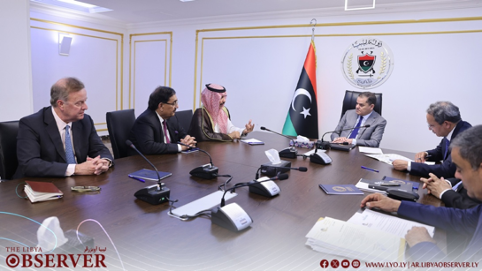
(The name of the organization is given as Baker International Corporation in the coverage of this meeting by English-language Libyan news websites. However, Douglas Baker, whose photograph was included in the news report of the meeting with Dbeibah, is the president of Baker Global Advisory.)
According to news reports, Baker also met with Libyan officials other than Dbeibah. Douglas Baker’s CV gives an idea of his company’s objectives in Libya. The following information is contained in his CV:
“Doug Baker is the founder of Baker Global Advisory, an international consulting practice that provides impartial expert advice to corporations, hedge funds, entrepreneurs, and governments. In 2019, Doug founded Rushmore Strategic Advisors, a public affairs and advocacy group, to meet the needs of a growing clientele seeking a nuanced approach to their dynamic regional issues. Currently, Doug serves on the board for Persistent Sentinel, a U.S.-based software firm that integrates data on complex border security programs, and Atlas Building Technologies, a start-up in the international building supply sector that provides more affordable construction processes using advanced materials and technologies. During the presidency of George W. Bush from 2005 to 2008, he was Special Assistant to the President for Homeland Security and Senior Director for Border and Transportation Security Policy. He served as the Deputy Assistant Secretary in the United States Department of Commerce from 2001 through 2005, where he was a policy advisor to the Secretary and Under Secretary for International Affairs.”[6]
Another area of activity for Douglas Baker’s company is Ukraine. Baker’s contacts in Ukraine in January were reported in the Ukrainian press.[7]

In the US, close links between the government and organisations such as consulting firms and private military companies are well known. Many former senior government officials hold senior positions in such companies. Many of these companies are also used by the US Department of Defence or the CIA in covert operations.
US-Türkiye Relations, Africa and Central Asia
The essence of the USA’s strategy in Africa is to create bridgeheads in certain regions in order to stop the growing anti-imperialist movement on the continent and to regain the positions they have lost. African states mobilizing against interventionist imperialism, especially France and US, along with developing multipolarity, resulted in US decline across Africa.
The US wants to take advantage of Türkiye’s ‘balance of power’ policy. It wants to benefit from Türkiye’s relations with Central Asian and African countries and use Türkiye’s growing influence in the region against Russia and China. The US aims to organize cooperation between these countries and Türkiye in such a way as to enable these countries to move away from Russia and China. This is why the US is offering Türkiye various carrots.[8]
Remarkable information on this subject was also part of a briefing by US State Department officials before the Türkiye-US Strategic Mechanism meeting in Washington on March 7–8. The official said at the briefing, which was held at the US State Department ahead of Fidan’s visit: “We believe there are many opportunities to work with Türkiye in regions such as Africa and Central Asia to achieve the necessary development and to counter the influence of China and Russia in these regions.”[9]
The need for a Russia-Türkiye-Egypt axis in Libya
After a general agreement was reached between Türkiye and Russia at a regional level in late 2019–early 2020, Libya’s situation has become relatively stable. As a result of the understanding developed and advanced in the meetings between Turkish President Tayyip Erdoğan and President of the Russian Federation Vladimir Putin, the period in which the United States remained out of action in Libya had begun. After that, the gains of Türkiye followed. An important development that changed the balance in terms of Türkiye’s rights and interests in the Eastern Mediterranean was the maritime jurisdiction delimitation agreement signed between Türkiye and Libya on 27 November 2019. It was approved by the Libyan Presidential Council of National Consensus on 6 December 2019, and entered into force in Libyan domestic law. The agreement was announced to the world after being notified to the UN. As a result of this agreement, Libya and Türkiye are now maritime neighbours. Then, in addition to military cooperation, Turkey and Libya began extensive trade and economic cooperation. Since the establishment of the Government of National Unity, 11 memoranda of understanding have been signed between the two countries in various fields. The last link in this chain was the agreement in October 2022 that allowed Türkiye’s hydrocarbon exploration activities in Libya.
However, recently (especially since before the presidential elections in Türkiye in May 2023), Türkiye’s achievements in Libya have also been endangered by its line of seeking “harmony with the US and the West,” which is called the “balance policy.” As a result of this line in Libya, the US influence on the Dbeibah administration increased, while Turkey’s influence gained through coordination with Russia began to weaken.
As a result, the emerging geopolitical situation is as follows: Türkiye’s interest is to ensure that the Libyan problem is solved in coordination with Russia and also Egypt, with which Türkiye has recently normalized relations and reached a rapprochement. This is in the interest not only of Türkiye but also of all the countries in the region. These three countries, which have relations with different parties in Libya, can come to a common point, prevent the US from regaining influence in the region, and steer developments in line with their own interests.
[1] Al Monitor, Inside the plan to send American diplomats back to Libya, March 28, 2024. https://www.al-monitor.com/originals/2024/03/inside-plan-send-american-diplomats-back-libya
[2] https://www.state.gov/g7-italy-2024-foreign-ministers-statement-on-addressing-global-challenges-fostering-partnerships/
[3] Libya Tribune, Private Military Companies Continue To Expand In Africa, December 15, 2023. https://en.minbarlibya.org/2023/12/15/private-military-companies-continue-to-expand-in-africa/
[4] https://uwidata.com/33946-libya-changes-focus-of-international-security-partnership-from-turkiye-to-us/
https://www.aydinlik.com.tr/haber/abdli-askeri-sirket-amentumlibyada-harekete-gecti-karanlik-amerikan-firmasi-amentumun-libyadaki-varligi-amentum-dibeyde-hukumetiyle-isbirligi-mi-yapti-465688
[5] The Libya Observer, Baker International eyes opportunities in Libya, meets with PM, 27 March 2024. https://libyaobserver.ly/economy/baker-international-eyes-opportunities-libya-meets-pm
[6] https://bakerglobal.net/
[7] https://www.vin.gov.ua/news/ostanni-novyny/60189-vinnychchynu-z-robochym-vizytom-vidvidala-komanda-ekspertiv-baker-global-advisory
[8] For an interesting assessment of this issue, see Mammadov Ali, The United States can’t offset its rivals in Central Asia alone. Türkiye can help, Atlantic Council, 14 August 2023.
[9] Anadolu Agency, 5 March 2024







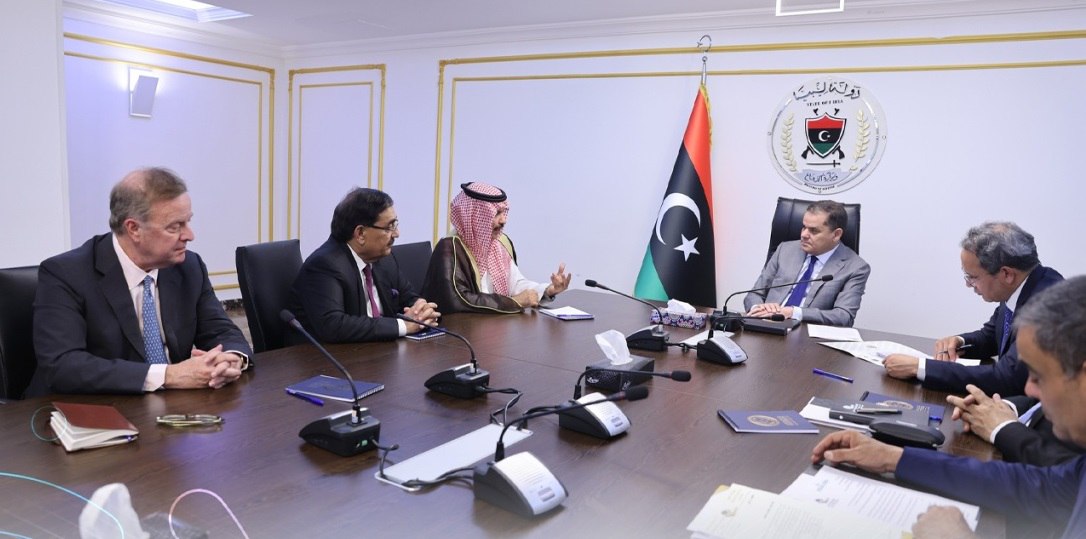
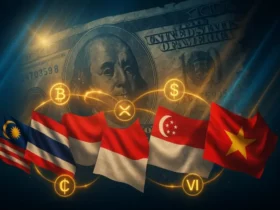
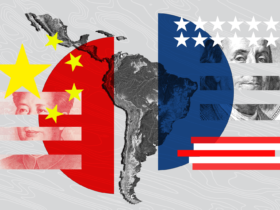


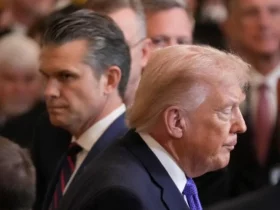
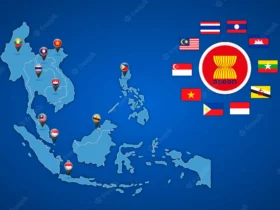
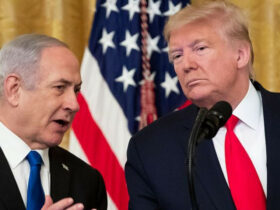


Leave a Reply